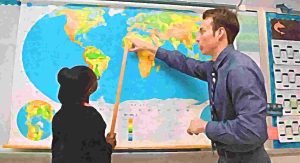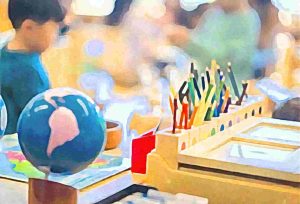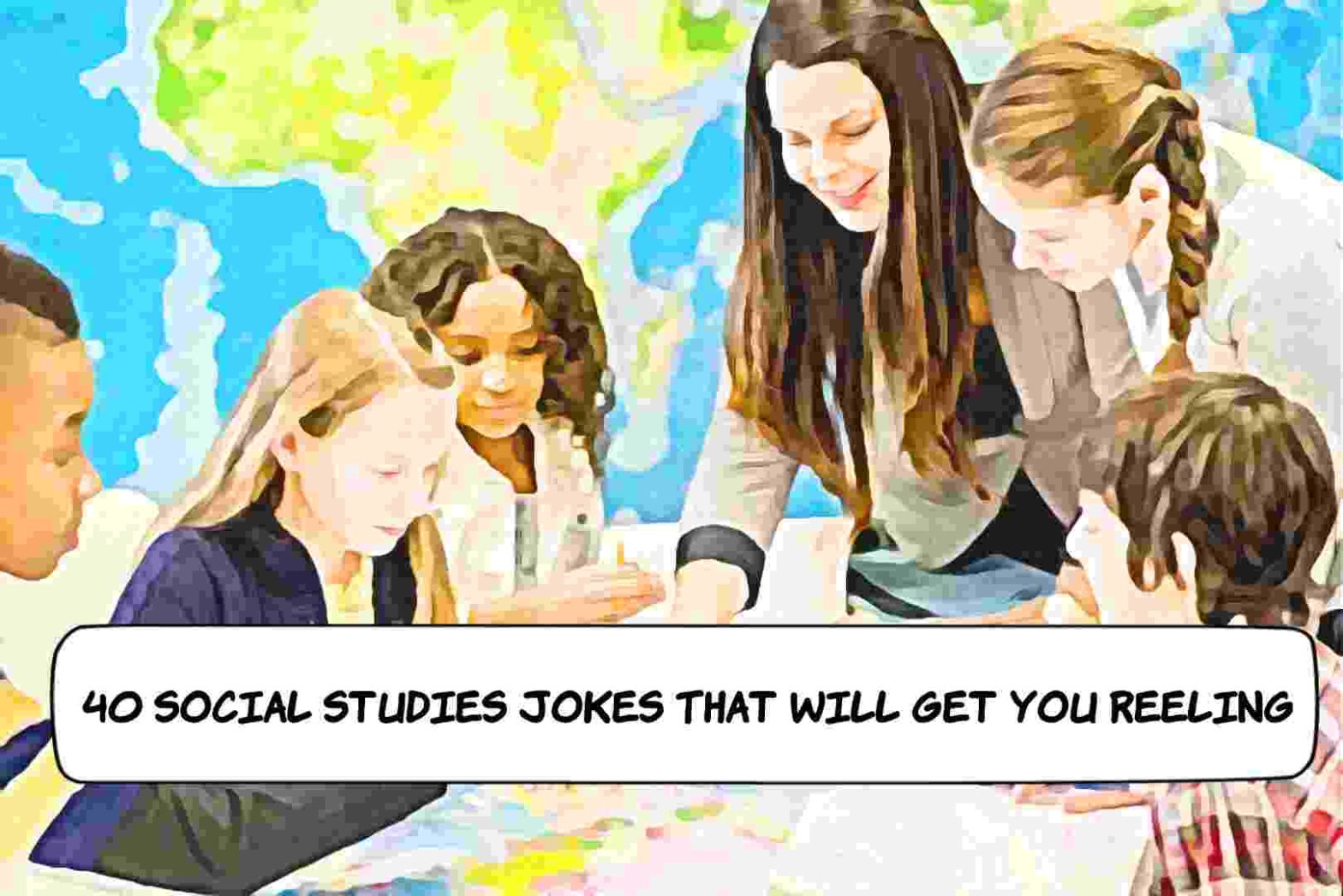Social studies can be hard, but jokes make it less stressful. Jokes about social studies make the class more fun and exciting.
And even for students, when they laugh at jokes about history or geography, they tend to remember the stuff better.
The good thing is that these jokes are about things we know, like what’s happening now or something we see every day.
List of 40 Funniest Social Studies Jokes
1. Why was the math book sad? Because it had too many problems but no solutions – just like society.

Just like the book has lots of problems but no solutions, society often faces many problems without clear answers. Some things are funny because they are true, and this line is one of them.
2. Why was the political science class always entire? Because it had bipartisan appeal.
When something has “bipartisan appeal,” it means both sides of the political spectrum like it.
So, saying the political science class is always entire because it has “bipartisan appeal” suggests that students from different political beliefs enjoy it. It’s a clever way of showing that the subject attracts everyone.
3. Why was the geography book always so confident? Because it knew where it stood – on the shelf.
Hasn’t anyone thought about it yet? Books on geography “know where they stand,” which can mean both physically (on the shelf) and metaphorically (in terms of its knowledge)
4. Why did the Social studies teacher never trust stairs? Because they’re always up to something.
Feel free to play with the idea that the teacher doesn’t trust stairs because they’re “always up to something.”
“Up to something” can mean being mischievous, but it’s also literally true for stairs because they always go up. You dig now?
5. Why did the student bring a ladder to social studies class? Because he heard the course was full of high-level discussions.
As long as you’re making a joke, there’s no crime in mixing academic stuff with a bit of nonsense. That’s what makes it a fun trick to share in class.
“High-level discussions” in social studies classes usually mean profound talks about important things. But the joke takes “high-level” literally.
6. What did the globe say to the atlas? I may be smaller, but I’m way easier to spin!
Any punchline that will give personalities to the globe and the atlas, two things we use in social studies, is welcomed.
You’re also helping the students, while laughing, to remember that the globe is more straightforward to use when studying geography—such a fun way to talk about tools in class.
7. Why was the history book always in a hurry? Because it had a lot of chapters to cover!
I’ve always wondered if there are more exciting ways to show how much information there is in history books. This joke!
It makes it easier for students to understand the idea that history covers a lot of different topics and periods.
8. What do you call a student who gets all the answers right in geography class? Well-versed!

Another playing with words, but this time, related to geography. It calls a student “well-versed” when they get all the answers right in geography class. “Well-versed” means knowledgeable. You dig now?
9. Why did the history teacher bring a ladder to class? Because he heard the course was full of high points.
This one is a sure guarantee for laughs. In history, “high points” means essential moments, but it also sounds like “high points” as in high places. So why not bring in that literal interpretation for your next comedy show time?
10. Why did the history teacher go to the bank? To get his change of reigns!
“Reigns” means the time a ruler is in power, but it sounds like “reins,” which are straps used to control a horse.
With this in mind, saying your history teacher went to the bank to get his “change of reigns,” as if he’s exchanging rulers instead of money, will definitely crack others up.
11. Why did the Social studies teacher bring a mirror to class? To reflect on society.
Reflecting on society means thinking deeply about culture, but it also sounds like using a mirror to see yourself. So, when you incorporate that into a joke, it all comes together and makes sense.
12. What did the geography teacher say when the student couldn’t name any European countries? Don’t you know your continentals from your vowels?
You may not know a student who can’t tell the difference between European countries (like France or Germany) and vowels (like A, E, I, O, U), but this joke sounds good to hear.
You’re mixing the idea of mixes geography with language cleverly, and that will make some serious good laugh.
13. What did the student say when the teacher asked him to name the first Roman emperor? “Julius, because Caesar salad comes before everything!”
It makes sense when you can help people remember historical facts while also making everyone in class laugh.
“Julius,” as the first Roman emperor, is a good pun for “Caesar salad” because “Julius Caesar” is a famous historical figure.
14. Why was the civics teacher good at basketball? They knew how to navigate the court of law.
Some jokes you tell you speak volumes of your ability to reason sharp. “Navigate the court of law” is a play on words since “court” can mean both a basketball court and a legal court.
If the civics teacher, in reality, knows a thing or two about playing basketball, indeed, then this joke is a bang!
15. Why was the civics class always so lively? They were practicing their right to free speech.

Actually (jokes apart), students’ energetic debates and discussions are a way of exercising their freedom to express themselves.
However, you can make a joke about that by connecting the lively discussions in civics class with the right to free speech.
16. Why did the history textbook feel outdated? It was stuck in the past.
Many people already talk about history textbooks as outdated because it hasn’t been updated.
But the real humor from that idea is making a joke out of the nature of history itself, saying it’s “stuck in the past” because history is all about the past.
Students in Social Studies class would likely find it amusing because it’s both intelligent and relevant to the subject they’re studying.
17. What did the map say to the compass? You always point north, but I get to show the whole world!
Jokes are funnier when they are relatable. A social studies student already knows that the compass always points north, but the map shows the whole world.
So, it’s an opportunity to compare the map and the compass funnily.
18. What’s the difference between a knight and a shoulder? A knight has more shining armor.
“Knight” sounds like “night,” and it’s common for knights to wear shiny armor. So, this joke is a chance to say the knight has more shiny stuff than just a shoulder.
19. Why was the history teacher always calm during exams?
Social studies teachers, especially the ones who take history, aren’t constantly worried because they know what’s going to happen since history tends to repeat itself.
This may not be true, but when you put a joke to it, people will connect the dots.
It’s entirely relatable for students because they understand the stress of exams, and it’s nice to think that the teacher isn’t worried because they know what to expect.
20. How do you know a civilization is advanced? If they invented cheese before wheels.

Usually, we think that inventing the wheel is a sign of being advanced, right? Well, humor can come from flipping the script.
This joke is even a playful way to show that progress and advancement can look different in different cultures.
21. Why did the history textbook go to therapy? Because it had too many issues.
Students can relate to feeling overwhelmed by all the information in their textbooks.
So, jokes that allow you to acknowledge that while also making history class a bit more enjoyable will always fly.
22. Why did the globe get detention? It kept rolling off the desk!
Since Social Studies often involves learning about maps and geography, using the globe in a joke connects to what you’re studying, and it can make everyone smile.
It’s not something you expect everyone to laugh hard at, though.
23. What’s the fastest way to travel through time? Read an excellent book.
Again, some things are funny because they are pure facts.
While it’s not literal time travel like the ones you see in science fiction, reading a captivating book can transport you mentally and emotionally to different periods and places depicted in the story. So jokes like these are worth the try.
24. Why did the compass need a nap? It was feeling directionless.
Usually, when someone says they feel “directionless,” they mean they lack purpose or guidance in life. The irony of a compass feeling “directionless” because it needs a nap indeed strikes humor.
25. Why did the history teacher love old jokes? Because they were history!
“His-story” is a play on words, combining “history” with “his,” implying that the jokes belong to the history teacher’s personal story. We can never get enough of puns as far as social studies subjects go.
26. Why was the geography student constantly tired? Because he had been around the world and back.
You can expect people to laugh when you make joke that doubles as a pun.
27. What do you call a dinosaur with a thesaurus? A thesaurus Rex!
Here’s another classic play on words, specifically on the name of the dinosaur, “Tyrannosaurus Rex,” and the word “thesaurus,” which is a reference book containing synonyms and antonyms.
By combining these two terms, the joke creates a pun: “A thesaurus Rex,” which sounds like “Tyrannosaurus Rex.”
28. How do you know a civilization is peaceful? If their wars are fought with paintballs.
Who uses paintballs instead of actual weapons for war to show how peaceful a civilization is? Of course, no one. But this line is a playful way to engage the class, especially when the topic is about peace and conflict resolution.
29. Why was the economy like a broken pencil? Because it had no point.
You will send the entire class bursting into laughter when you drop the surprising punchline, “Because it had no point,”
It plays with the double meaning of “point” – it’s both the tip of a pencil and having a purpose.
30. Why did the Roman emperor get voted out of office? He kept saying “toga for it!” instead of “vote for it!”
When asked why the Roman emperor was voted out of office, the expected reason might be something serious. However, when you say “toga for it!” instead of “vote for it!” and “toga” refers to the traditional Roman clothing, it makes things funny/
Clever puns like these can’t go unnoticed, with laughter filling the air.
31. What do you call a historian who loves terrible jokes? Punishment!
The punchline “Punishment” sounds like “punishment,” which is what happens when you’re in trouble. But here, it’s a joke because it’s saying the historian is in trouble for liking puns. It’s silly and unexpected, which makes it funny.
32. Why was the history teacher always a good listener? Because he knew every story had two sides.
You can say your teacher is good at hearing different sides of the story without saying those words. Wordplay is on full throttle here, and only deep thinkers will catch it at the first throw.
33. What did the globe say to the atlas? “I’m the world; you’re just flat-out boring!”
“Flat-out boring” means something is really dull, but here, it’s also poking fun at the atlas for showing the world as flat, which isn’t true. It’s cool when you can tell a social studies joke with geography knowledge.
34. What do you call a map that tells bad jokes? A pun-topography map
You can mix “pun” (which means a kind of joke) with “photography” (taking pictures), which now sounds like “cartography” (making maps). When telling a joke, who says you can’t be creative and bookish?
35. Why did the history textbook go to the doctor? Because it had too many footnotes.
Instead of a person going to the doctor, you can imply that the textbook itself went because it had “too many footnotes.”
Use this line as a silly way to talk about how readers can sometimes have lots of extra details, making them feel overwhelmed. Social studies students will relate, trust me.
36. Why did the sociologist have no friends? He studied groups instead of individuals!
Someone who studies society might not prioritize personal relationships. There’s no harm in poking fun at this particular stereotype.
37. Why do we bring a ruler to Social Studies class? To measure society’s standards.
You can bring out humor in many things when you use a word in two different ways. Usually, a ruler is a tool to measure length. But here, it’s used as if we’re measuring “society’s standards,” meaning the rules and norms of society.
38. Why was the economy like a joke? Because sometimes it fell flat.
When you’re telling your friends a joke, but it doesn’t make them laugh, you might say, “Well, that fell flat!” It means the trick didn’t work. Now, think about the economy and how it goes up and down. Do you get it?
39. Why did the government building have so many doors? To open up opportunities!
Doors are there to give chances to people. So, you can humorously imply that government building has many doors to give people more opportunities in life…or shut them out from cases (depending on your perspective)
40. Why did the geography book blush? Because it saw the Earth’s curves.
“Curves” can mean both the shape of the Earth and the shape of a person’s body. So, play on words like these can definitely command some good laughter.

Leave a Reply